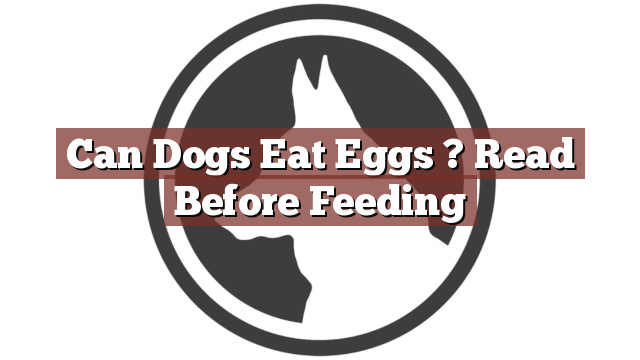Understanding Your Dog’s Dietary Needs
As a responsible dog owner, it is essential to understand and meet your furry friend’s dietary needs. Providing a balanced and nutritious diet is crucial for their overall health and well-being. While dogs are primarily carnivorous, they can also benefit from some plant-based foods. However, it is important to note that not all human foods are safe for dogs to consume. Before introducing any new food into your dog’s diet, it is essential to research and consult with your veterinarian to ensure it is safe and appropriate.
Can Dogs Eat Eggs? Read Before Feeding
Now, let’s address the question that many dog owners often ask: can dogs eat eggs? The answer is a resounding yes. Eggs are a great source of protein, vitamins, and minerals, making them a healthy addition to your dog’s diet. They are rich in amino acids that help support muscle development and repair. Additionally, eggs contain essential fatty acids that promote a healthy coat and skin.
However, it is important to prepare eggs properly before feeding them to your dog. It is recommended to cook the eggs thoroughly to avoid the risk of salmonella, a bacteria that can cause food poisoning. Raw eggs should be strictly avoided, as they may lead to biotin deficiency in dogs. Biotin is a vitamin that aids in healthy skin, coat, and digestion. Cooking eggs also makes them easier for dogs to digest, ensuring they receive maximum nutritional benefit.
Pros and Cons of Feeding Eggs to Dogs
Feeding eggs to your dog can offer several benefits. As mentioned earlier, eggs are an excellent source of protein, which is essential for muscle development and repair. They also contain vitamins A, D, E, and B12, as well as minerals such as iron and selenium. These nutrients contribute to your dog’s overall health and immune system.
While eggs are generally safe for dogs, some considerations and precautions should be taken. Dogs with certain health conditions, such as pancreatitis or allergies, may not tolerate eggs well. It is recommended to consult with your veterinarian if your dog has any underlying health issues. Additionally, moderation is key when feeding eggs to your dog. Too many eggs can lead to an imbalance in their diet, potentially causing digestive upset or weight gain.
Conclusion: Considerations and Recommendations
In conclusion, dogs can safely consume eggs as part of a balanced diet. Eggs provide various essential nutrients, contributing to their overall health and well-being. However, it is crucial to cook the eggs thoroughly to eliminate the risk of salmonella and avoid feeding them raw. Furthermore, it is important to consider your dog’s individual health needs and consult with a veterinarian before introducing any new food into their diet. Remember, moderation is key, and a well-balanced diet is vital for your beloved canine companion’s optimal health.
Thank you for taking the time to read through our exploration of [page_title]. As every dog lover knows, our furry friends have unique dietary needs and responses, often varying from one canine to another. This is why it's paramount to approach any changes in their diet with caution and knowledge.
Before introducing any new treats or making alterations to your dog's diet based on our insights, it's crucial to consult with a veterinarian about [page_title]. Their expertise ensures that the choices you make are well-suited to your particular pet's health and well-being.
Even seemingly harmless foods can sometimes lead to allergic reactions or digestive issues, which is why monitoring your dog after introducing any new food item is essential.
The content provided here on [page_title] is crafted with care, thorough research, and a genuine love for dogs. Nevertheless, it serves as a general guideline and should not be considered a substitute for professional veterinary advice.
Always prioritize the expert insights of your veterinarian, and remember that the health and happiness of your furry companion come first.
May your journey with your pet continue to be filled with joy, love, and safe culinary adventures. Happy reading, and even happier snacking for your canine friend!

